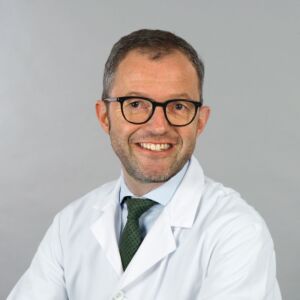Overview
The effects of dysphagia are serious and can lead to consequences such as malnutrition or dysphagia-associated pneumonia and limit social well-being. Frequent clearing of the throat or coughing when eating and drinking, shortness of breath, avoidance of certain foods, changes in voice, unintentional weight loss or unclear increases in temperature or even fever can be a sign of a swallowing disorder.
It is important not to trivialize these symptoms. These should be clarified by specialists (phoniatrists and clinical speech therapists) by means of an instrumental swallowing examination (Fiberoptic Endoscopic Evaluation of the Swallowing Process (FEES®)), among other things. The further treatment procedure is then determined and, if necessary, speech therapy for swallowing is initiated. The Phoniatrics and Clinical Speech Therapy department focuses on swallowing, among other things:
- Diagnosis and treatment of inpatients and outpatients
- Advice and therapy for neurogenic swallowing disorders (e.g. stroke, Parkinson’s disease)
- Aerophagia and supragastric belching (air burping)
- Phagophobia (fear of swallowing)
- Velopharyngeal insufficiency (dysfunction of the soft palate)
- Advice and therapy for structural swallowing disorders (e.g. head and neck tumors)
- Care of patients before and after laryngectomy (total laryngectomy)
Speech therapy for swallowing
Based on the standardized examination, a specific, individualized speech therapy for dysphagia is carried out. Speech therapy for swallowing includes a range of treatment concepts (e.g. functional dysphagia (FDT), manual swallowing therapy, aspects of facio-oral tract therapy (F.O.T.T.)).
Evidence-based, function-oriented therapy (FDT) in particular includes specific training and strengthening of the affected swallowing muscles, learning swallowing techniques and recommendations for the appropriate diet.
As part of the interdisciplinary intake consultation for patients with head and neck tumors, a speech therapy assessment of swallowing, voice and speech functions takes place. These patients receive standard speech therapy before, during and after treatment (surgery and/or radio(chemo)therapy) as part of our speech therapy pretreatment assessment and prehabilitation concept, both as inpatients and outpatients, so that the consequences of tumor treatment can be limited in terms of food intake and/or speech.
For patients who have to have their larynx removed due to a tumour (laryngectomy), an information session is organized with a patient so that issues relating to daily life after the operation (eating, drinking, speaking, etc.) can be discussed. We provide further inpatient and outpatient care.
